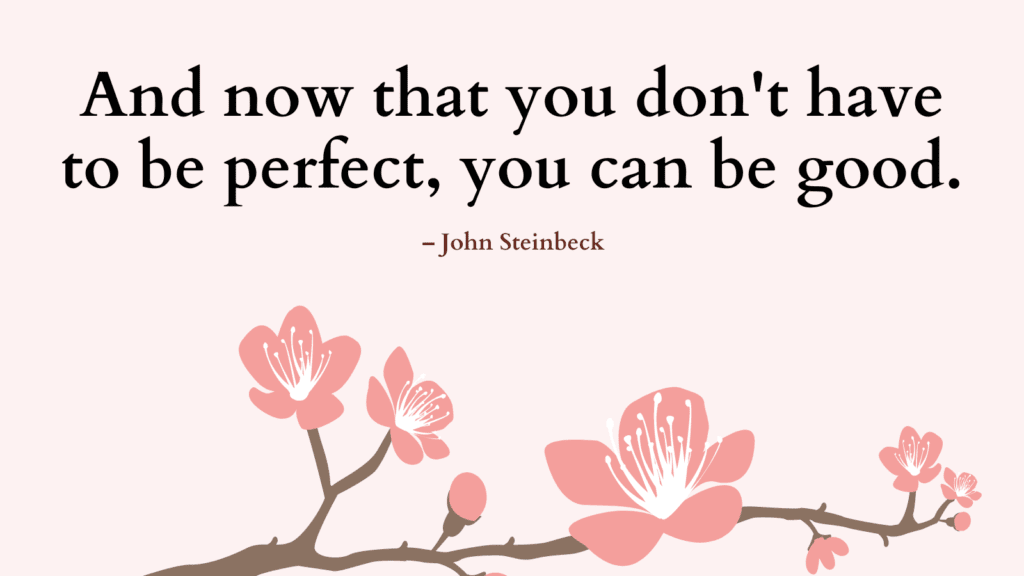This post contains some of the best detachment quotes.
What Is Detachment?
Detachment is the ability to let go of emotional attachments to people, things, or situations.
It means being able to observe and experience without being overly influenced or affected by them.
Detachment doesn’t mean that you are cold-hearted or don’t care about others; it’s simply a way of living with a clear mind and peaceful heart.
By practicing detachment, you allow yourself to be free of negative emotions such as fear, anger, and resentment, which can hold you back from experiencing happiness and peace in your life.
Instead, you are able to focus on the present moment and appreciate what is truly important to you.
Detachment Quotes
1. ”Detachment is simply watching the events that are unfolding around you, getting involved only when your journey is part of the experience.” – Karen Casey
2. “Detachment is making no one a project.” – Karen Casey
3. “Detachment means taking no hostages.” – Karen Casey
4. “Detachment means giving up outcomes.” – Karen Casey
5. “Detachment is understanding that we are never the cause of someone else’s actions.” – Karen Casey
6. “Detachment means freedom from obsession.” – Karen Casey
7. “Detachment is knowing that what others do is not a reflection on you.” – Karen Casey
8. “Detachment may mean doing nothing.” – Karen Casey
9. “Detachment may be remaining quiet.” – Karen Casey
Related: Top 15 Compassion Fatigue Quotes
10. “Detachment means not letting the behavior of others cause you to suffer.” – Karen Casey
11. “Detachment is not letting someone else’s past determine your present.” – Karen Casey
12. “Detachment relies on the “little willingness” to surrender.” – Karen Casey
13. “Detachment is noticing people without judgment.” – Karen Casey
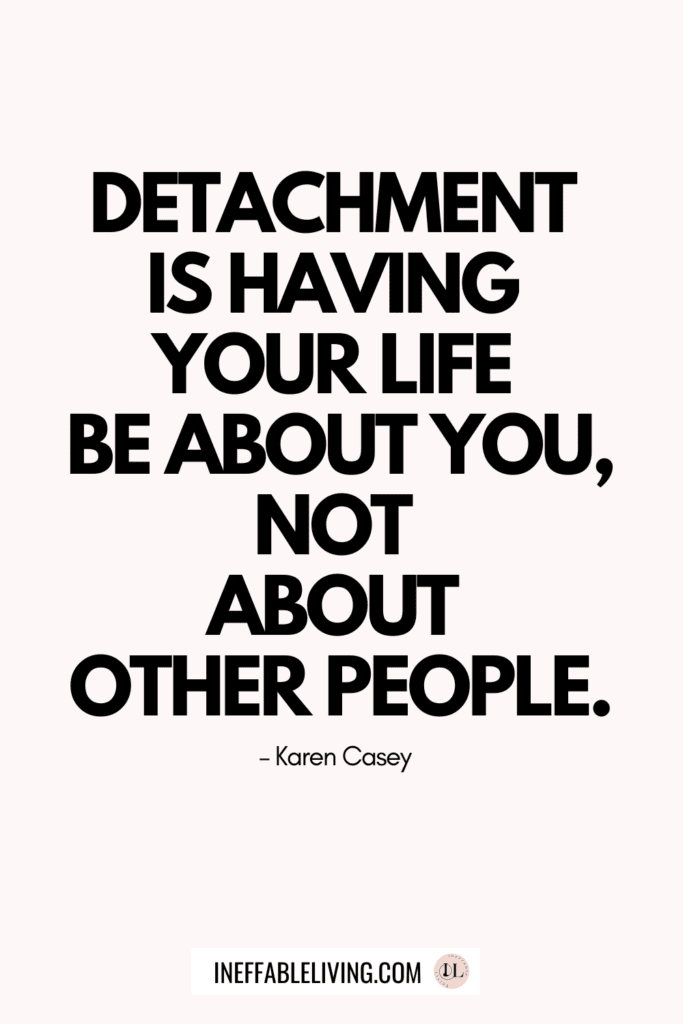
14. “Detachment is letting decisions that need to be made by others be only theirs.” – Karen Casey
15. “Detachment is “keeping it simple”—staying out of situations that don’t directly involve you.” – Karen Casey
16. “Detachment is having your life be about you, not about other people.” – Karen Casey
17. “Detachment is not being dependent on others for good feelings.” – Karen Casey
18. “Detachment means not being a victim anymore.” – Karen Casey
19. “Detachment is living one’s own life while letting friends and family live as they choose.” – Karen Casey
20. “Detachment is never letting someone else control how we think, feel, or behave.” – Karen Casey
21. “Detachment is freedom from relying on others to complete our lives.” – Karen Casey
22. “Detachment is knowing that others’ criticisms are about them.” – Karen Casey
23. “Detachment is not letting the mood swings of others determine your own mood.” – Karen Casey
24. “Detachment is knowing that happiness is the by-product of how we live our lives, not how others are living theirs.” – Karen Casey
Related: Best +35 People Pleaser Quotes To Help You Let Go Of People Pleasing
25. “Detachment is not needing attention from others to feel okay.” – Karen Casey
26. “Detachment is being able to care deeply about a situation or another person from an objective point of view.” – Karen Casey
27. “Detachment is letting others have their own opinions.” – Karen Casey
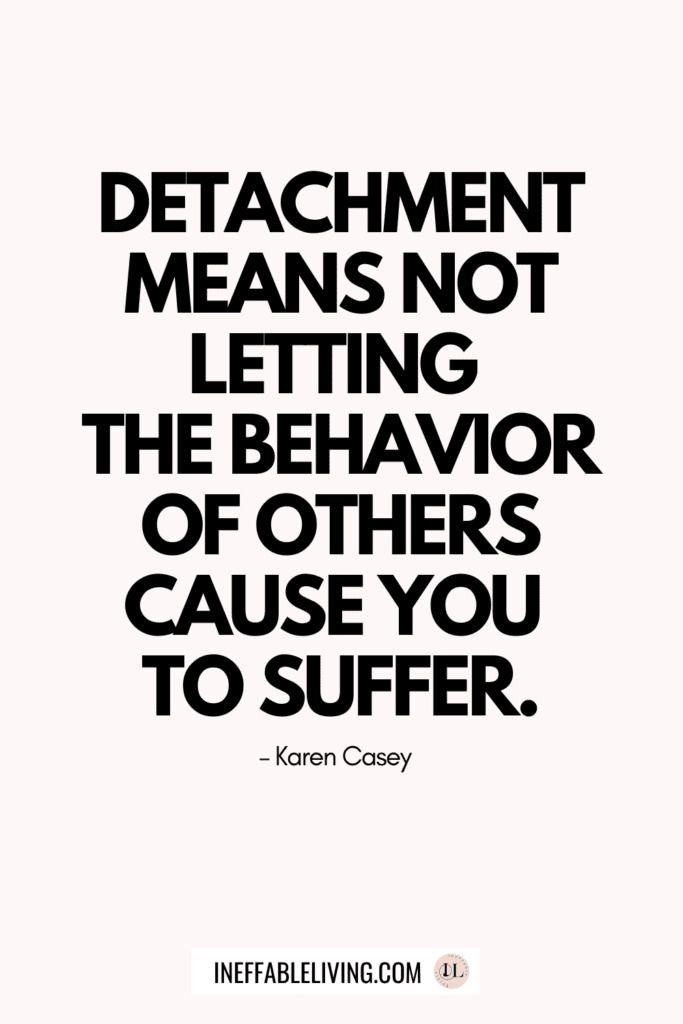
28. “Detachment is being able to let others journey wherever they need to go.” – Karen Casey
29. “Detachment is being able to walk away from situations that are not helpful to us.” – Karen Casey
30. “Detachment is letting others take care of their own affairs.” – Karen Casey
31. “Detachment is letting the outcome of another’s behavior be his or her problem.” – Karen Casey
32. “Detachment is doing the “next right thing” without focusing on the outcome.” – Karen Casey
33. “Detachment is looking at life from a distance.”– Karen Casey
34. “Detachment is knowing that you are not the center of anyone else’s life.” – Karen Casey
35. “Detachment is keeping your feelings separate from what others are doing.” – Karen Casey
36. “Detachment is refusing to let our interactions with others define us.” – Karen Casey
37. “Detachment is not disinterest, but that might be the first step.” – Karen Casey
38. “Detachment means no longer leading others’ lives.” – Karen Casey
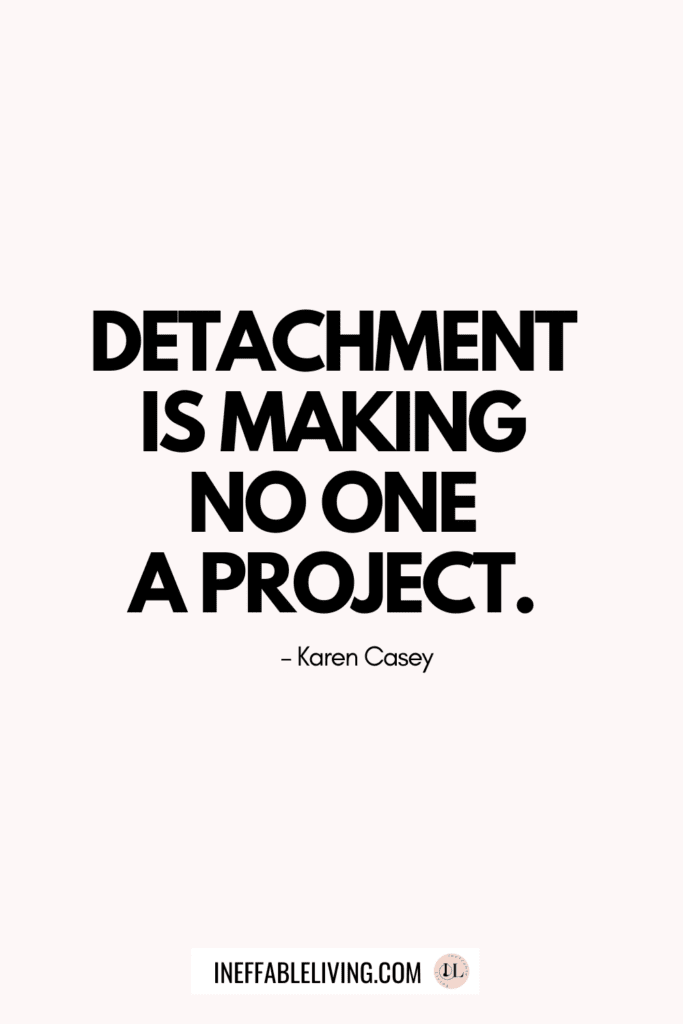
39. “Detachment is freedom from the desire to get someone back.” – Karen Casey
40. “Detachment is not letting anyone else decide how you feel.” – Karen Casey
41. “Detachment is being able to put yourself at the top of the list of “who needs care.” – Karen Casey
42. “Detachment is no longer “dancing” around someone else’s life.” – Karen Casey
Related: Best 6 Ways to Let Go of Wanting to Control Everything
43. “Detachment is accepting what we cannot change and changing only what we can.” – Karen Casey
44. “Detachment is not taking anyone else’s behavior personally.” – Karen Casey
45. “Detachment is no longer waiting for the other shoe to drop.” – Karen Casey
46. “Detachment is being able to move our minds away from the unhealthy places they want to go.” – Karen Casey

47. “Detachment is being able to stop our minds in midthought when the thoughts are not beneficial.” – Karen Casey
48. “The most loving thing we can do is let another person be free; that’s detachment.” – Karen Casey
49. “Unconditional love can be packaged in many ways. Detachment may not seem like one of them, but it is.” – Karen Casey
50. “Saying “I can choose peace instead of this” is one way of embracing detachment.” – Karen Casey
51. “Our willingness to detach from our loved ones demonstrates to them that we trust them.” – Karen Casey
52. “Making the decision to change how we think can open the door to the practice of detachment.” – Karen Casey
Related: People Pleaser Quiz (+Top 21 Proven Ways to Stop People Pleasing)
53. “Detachment is simply watching the events that are unfolding around you, getting involved only when your journey is part of the experience.” – Karen Casey
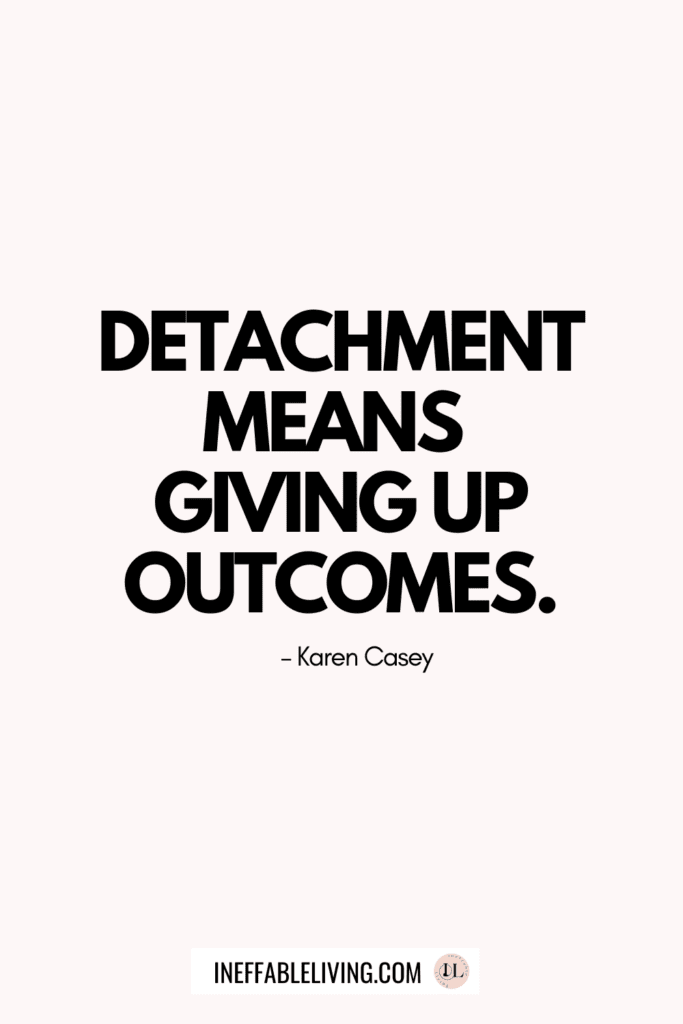
54. “Coming to see that detachment was letting go, releasing others to make their own choices, their own mistakes, to realize their own dreams, initially felt like loneliness to me. My life simply had been a dance around others. Letting them be meant I was dancing alone. But then I discovered the freedom I had to actually move in ways that pleasured me, and joy replaced the tension that had haunted me for years.” – Karen Casey
55. “Having a simpler life, one that concerns itself with only our activities, is really so refreshing. So energizing. So peaceful. Until we remove our attention from the machinations of others, we can’t even get a sense of what having more energy, extended periods of peace, and the joy that comes with detachment feels like.” – Karen Casey
56. “Detachment is a loving act for all concerned. No one wants to be the constant center of someone else’s life, at least not for long. Two people lose their lives when either one is constantly focused on the other. That’s not why we are here.” – Karen Casey
57. “Detachment is truly a gift of great proportions. Nothing can be well attended to when our emotions are attached to the actions of others.” – Karen Casey
58. “Detachment is far more analogous to unconditional love than to acquiescence. It means letting our loved ones make their own choices, and that doesn’t mean we don’t care. On the contrary, we care so much about them that we know they must travel their own path, rather than ours.” – Karen Casey
59. “Detachment might well be considered one of the most loving of all responses to those who travel with us. While it’s true, as I have written elsewhere, that we travel intentionally with specific people, we do it in concert as learning partners, not as mirrors of one another.” – Karen Casey
Related: Top 25 Tips On How To Set Boundaries In A Toxic Relationship? (+FREE Worksheets PDF)
60. “Detachment is a gift to each of us, really. Whether we are detaching from others or they from us, it’s a show of respect every time. To not allow others, or to not be allowed, to make personal choices limits our growth. Our time here is purposeful.” – Karen Casey
61. “Detachment is a loving act and quite often a very difficult one. Usually we have to consciously make the decision to let someone else chart their own course and thus define their own life. We mistakenly think that since we are traveling together, we should be able to influence the direction a friend or lover takes, but that’s not the case. Possibly, our opinion will be sought, and in some cases adhered to, but there are no guarantees. We travel side by side because of the lessons we share, and one of the lessons we all have to learn, it seems, is that we cannot control the actions, the opinions, or the decisions anyone else makes.” – Karen Casey
62. “Detachment can mean something as simple as walking away from a discussion that has no solution or excusing ourselves from an argument that is getting out of control.” – Karen Casey
63. “Taking baby steps with this idea of detachment is a good beginning. Most of us don’t come by this trait naturally. We easily get drawn into the dramas around us, particularly those involving our loved ones. It’s generally with those who are the closest to us that we have the conversations that might turn tense. The good news about this is that we have daily opportunities to practice detaching our emotions from these difficult conversations.” – Karen Casey
64. “The idea of detachment doesn’t mean we don’t care what’s happening to others. Nor does it mean that what’s happening has no effect on us. It simply means that we don’t have to react to any situation. We can observe it, make a judgment about it, and then choose a proper response if one is actually called for, or perhaps not respond at all.”– Karen Casey
Related: Healthy Boundaries Quiz (+Free Pdf Worksheets)
65. “Being detached doesn’t mean we are oblivious to the thoughts, feelings, or actions of others. It just means that how we feel about ourselves isn’t controlled or even compromised by what others are doing. We are on parallel journeys, complementing one another but not determining the outcome for one another. Knowing that we don’t need someone else’s approval for us to do what feels right gives us the freedom and the permission to move forward in the ways we must if we are to fulfill our purpose here.” – Karen Casey
66. “Detachment, fully expressed, may seem a bit extreme. But like the ever-so-common phrase “You can’t be a little bit pregnant,” you can’t be a little bit detached. We are either our own person or we are not. To be fully detached doesn’t mean ignoring the others on our path, nor does it mean being unkind. But it does mean we make our own decisions regardless of the opinions and plans of others. Peace is the gift that’s realized when we decide who we will be and then be it.” – Karen Casey
67. “Embracing detachment is a wholesome commitment to make. It doesn’t make a culprit of anyone. Nor does it hold anyone hostage to whims and opinions. And best of all, it allows us to pursue the work that’s truly ours to do.” – Karen Casey
68. “At first I thought detachment meant ignoring others, turning my back on them completely. A mentor helped me to see that detachment meant loving others in the truest sense: letting them grow into their own skins, and not be extensions of me.” – Karen Casey
69. “Detachment is an interesting concept. It doesn’t mean being uncaring. It doesn’t mean being isolated and uninvolved. It means having emotional clarity, showing support where it’s needed, making apologies where necessary, and blaming no one.” – Karen Casey
70. “Detachment and disinterest are not the same, of course, but to the onlooker, the witness, they appear to be the same. I needed to act as if I were detaching even when I was still very emotionally charged up by the people or circumstances around me. I needed to prove to myself and others that I could let them be, that I could let be everything that involved others.” – Karen Casey
Related: The Process Of Turning Inward In 6 Simple Steps (Turn FOMO Into JOMO)
How To Practice Detachment?
Detachment is the ability to release oneself from being overly attached, emotionally invested or affected by external circumstances or events. Here are some tips on how to practice detachment:
1. Cultivate Mindfulness
Mindfulness is the practice of being present in the moment. It helps you observe your thoughts and emotions without getting lost in them.
2. Focus On The Bigger Picture
Instead of focusing on the details of a situation, look at the bigger picture. This helps to shift your perspective and reduces attachment to a specific outcome.
3. Let Go Of Expectations
Detachment requires letting go of expectations. When you let go of the need for things to be a certain way, you can be more open to different outcomes.
4. Practice Self-Care
Taking care of yourself, both physically and mentally, can help you detach from external factors. Engage in activities that bring you joy and make you feel good.
5. Embrace Uncertainty
Detachment means being comfortable with uncertainty. Learn to accept that life is unpredictable, and that not everything will go as planned.
6. Practice Gratitude
Gratitude helps you focus on the positive aspects of life, rather than dwelling on negative events or situations.
Remember, detachment is a skill that takes practice and patience. It’s important to approach it with an attitude of self-compassion.

References
- Portions of this article were adapted from the book Let Go Now, © 2010 by Karen Casey. All rights reserved.
